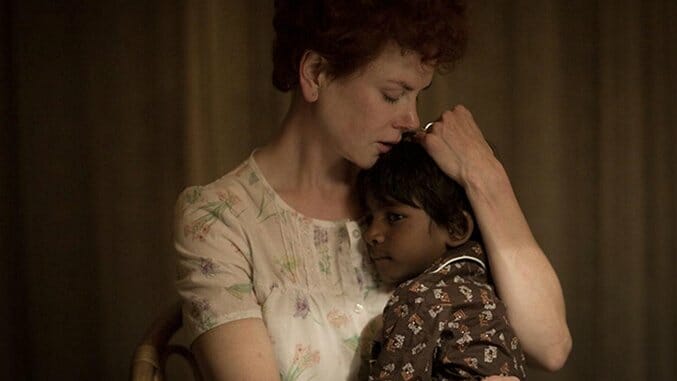Lion

You won’t know Garth Davis’s name unless you’re an avid fan of Jane Campion’s Top of the Lake, or you happen to love Schweppes commercials. Once you see his feature debut, Lion, you’ll know him as the filmmaker who brought you to tears just to smear them all over the screen. Lion is, both at first glance and after well-considered scrutiny, the kind of weepy that tends to get attention during awards season for being based on a true story and for striking its audience square in the lacrimal gland. Be warned: Lion will reduce you to a sniffling wreck.
Stone-hearted types may resist its cathartic charms, or they may try, but the film isn’t traditionally manipulative in the same vein as so many other movies of its make. Davis has a knack for engineering waterworks, and skill enough to break through the defenses of even the most stoic viewers—though only for half the film’s running time—but most of all he embraces authenticity in storytelling. It helps that Lion refrains from overwhelming mushiness and manufactured sentimentality, and also that its story has the rare power to appeal to viewers’ lachrymose center without any excess persuasion. Lion earns our unabashed blubbering not simply through its design but rather through the organic nature of its material.
In other words, the film doesn’t tinker with the truth more than it must in order to translate the chronicle of Saroo Brierley into cinema—which is a double-edged sword: That approach serves the inherently compelling drama of Saroo’s story wonderfully for its first chapter, but horribly for the inherently uncompelling drama of its second. Saroo is Lion’s protagonist, played by two actors at two different points in his life: Sunny Pawar plays him as a boy, and Dev Patel plays him as a man. Patel’s performance nearly anchors his stretch of the movie, but Pawar’s section works best thanks to the elemental mechanics Davis employs to draw out the tragedy in Saroo’s dilemma, never forcing it.
The based-on-a-true-story goes: Saroo lives with his family in Khandwa, a city in Madhya Pradesh, India. After he falls asleep on an empty train car, he ends up a thousand kilometers and change away, in Calcutta. He’s a lost child in a loud, unending cityscape where the common tongue isn’t his own, and his journey up to that point is harrowing, verging on nightmarish. Calcutta is no place for a lonely kid, especially a lonely kid who only knows Hindi and not Bengali or English, and Davis is fixated on the way that cities make people feel like foreigners in their own country. Saroo pushes through a crush of bodies exiting the train on its arrival in Calcutta, approaches a ticket counter to appeal for help, and is jostled, shouted at, shoved aside like any workaday inconvenience.
-

-

-

-

-

-

-

-

-

-

-

-

-

-

-

-

-

-

-

-

-

-

-

-

-

-

-

-

-

-

-

-

-

-

-

-

-

-

-

-








































